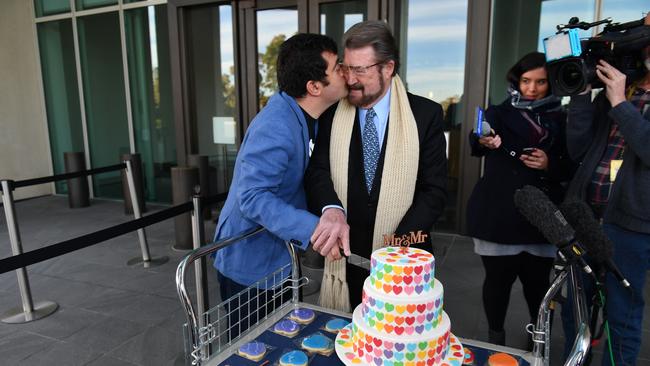It’s open slather in same-sex marriage vote
Australians face a campaign free-for-all on same-sex marriage as all sides mobilise to win a postal vote.

Australians face a campaign free-for-all on same-sex marriage as all sides mobilise to win a postal vote, amid fears there will be no rules to govern the ballot or curb offensive advertising.
Campaigners called for “truth in advertising” standards to keep the contest under control, as the government confirmed there were no rules, as there are in elections, to ensure equal time for Yes and No advocates.
The postal vote will face its first test, in a High Court hearing as soon as today, as marriage-equality groups argue the “survey” exceeds the government’s power by using the Australian Bureau of Statistics to gather the data without any legislation to authorise the $122 million outlay.
In a decisive move to show it was “game on” in the quest for votes, Bill Shorten and Greens leader Richard Di Natale both declared they would campaign for change, and launched rival bids to sign up members and enrol more voters.
Malcolm Turnbull is also calling for a Yes vote, while gay and lesbian groups swung behind the campaign for change in a bid to cool talk of a widespread boycott that would challenge the legitimacy of the ballot but also give the No case a huge advantage.
Australians at home and overseas will have until the close of business on August 24 to enrol to vote or update their existing enrolments, with ballot papers to be sent out from September 12 for an eight-week campaign that ends on November 7.
The legal details reveal the ABS has been ordered to gather the votes by state and territory, as well as at the “level of each electoral division”, so that all MPs will know the verdict from their electorates.
Labor MPs held fire for most of yesterday on whether they would back the process, but the Opposition Leader declared his hand in the afternoon by arguing the exercise was an “insult” to LGBTI people but that it was better to join the campaign than stage a boycott.
He said he would not blame people if they wanted to throw the ballot papers in the bin but that he would be campaigning for a Yes vote.
“I will do my bit, and I encourage people to join the movement for marriage equality, because no true leader is ever too busy to fight for a fair go in this country,” he told parliament.
“Equality is not a diary appointment you meet in three, six or eight months’ time.”
The remarks targeted the Prime Minister for stopping short of saying he would campaign for the change. “I will certainly support a Yes vote, as I’ve said I would in the past, but I have many other calls to my time,” Mr Turnbull said on Tuesday.
Education Minister Simon Birmingham said he backed the case for change and believed the view of the people would be a “unifying” moment for the country.
Advocates on either side of the debate expressed concern about the way the survey would be run by the ABS, given that it could not be conducted by the Australian Electoral Commission.
The government would need to legislate any plan to let the ABS run the survey under existing electoral laws, setting up a bill that the Senate would probably defeat.
A regulation to get the AEC to run the survey might also be struck down in the Senate or provide another way for opponents to challenge the plan in the High Court.
Labor deputy leader Tanya Plibersek highlighted the absence of rules by asking Mr Turnbull in parliament to confirm that the usual protections against electoral fraud, bribery and intimidation would apply.
He instead referred to communications laws, the rules overseeing the gathering of statistics and the criminal sanctions against false and misleading statements.
The Australian was told there were no obligations on broadcasters to offer equal time to either side of the ballot, as in an election. One executive said misleading and deceptive conduct rules would not apply, given the debate was not an issue of trade or commerce.
Marriage Alliance chief Damian Wyld, one of the four partners in the Coalition for Marriage, said he remained concerned about the impact of advertising in the postal vote.
“It was Marriage Alliance that had its advertisements black-listed by commercial stations who refused to play them,” Mr Wyld said. “We remain concerned that the pro-marriage campaign will be hamstrung and denied its voice by the same stations throughout this debate.”
Marriage-equality advocate and Just Equal spokesman Rodney Croome feared there were no advertising standards or ways to resolve disputes over returns. “The lack of advertising standards will only encourage the kind of hate and fearmongering that so many LGBTI Australians fear is coming down the line,” he said.
Australian Marriage Equality spokesman Clint McGilvray said the “policy on the run” with the postal survey raised concerns about how the debate would be conducted. Despite calls for a boycott, he urged Australians to enrol to prepare for the survey if it was cleared by the High Court.
The Public Interest Advocacy Centre filed a High Court challenge yesterday on behalf of Tasmanian independent MP Andrew Wilkie, the Parents and Friends of Lesbians and Gays, and Felicity Marlowe, a mother in a same-sex relationship. The Human Rights Law Centre has also lodged an application in the court on behalf of litigants, including Australian Marriage Equality and Greens senator Janet Rice.
Additional reporting: Joe Kelly, Caroline Overington


